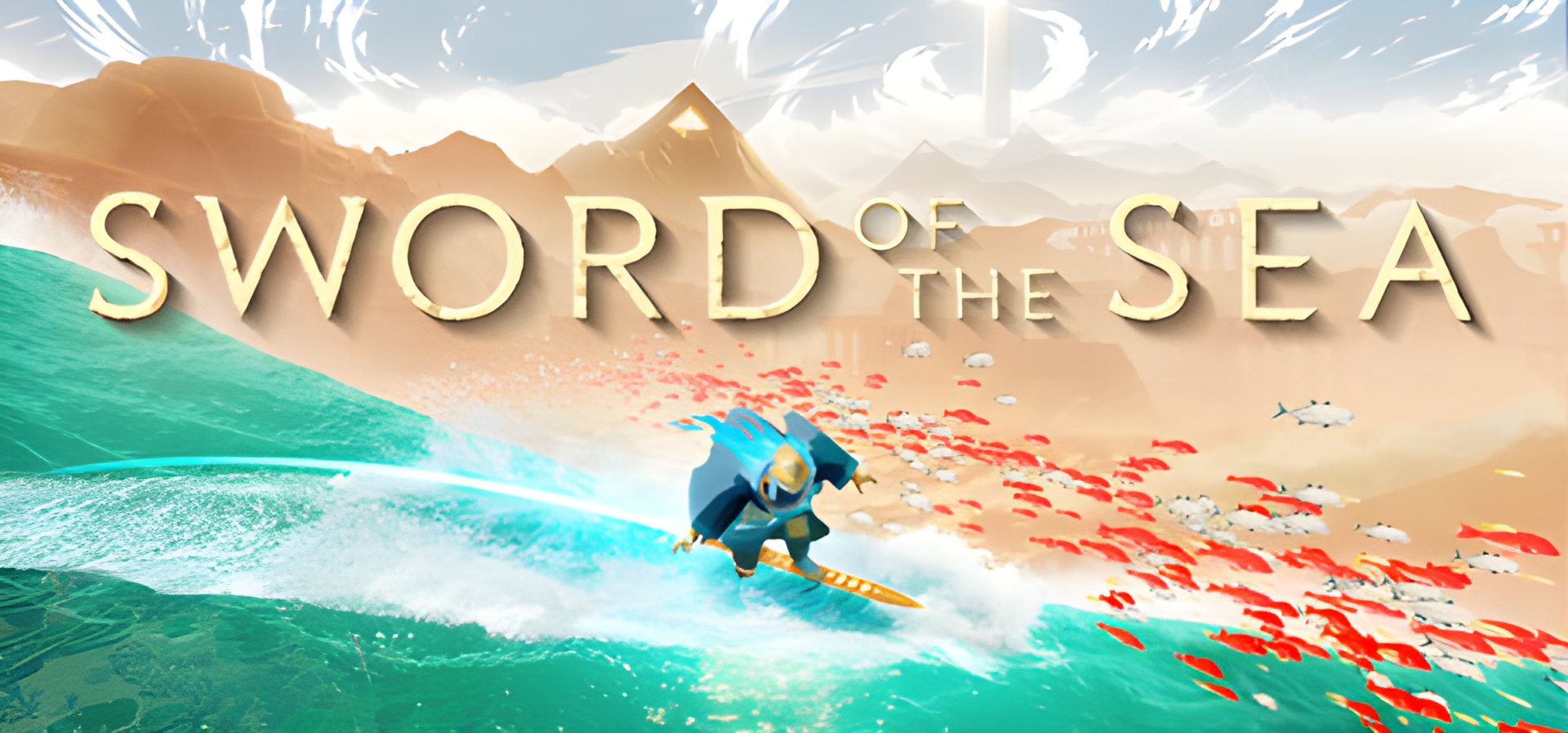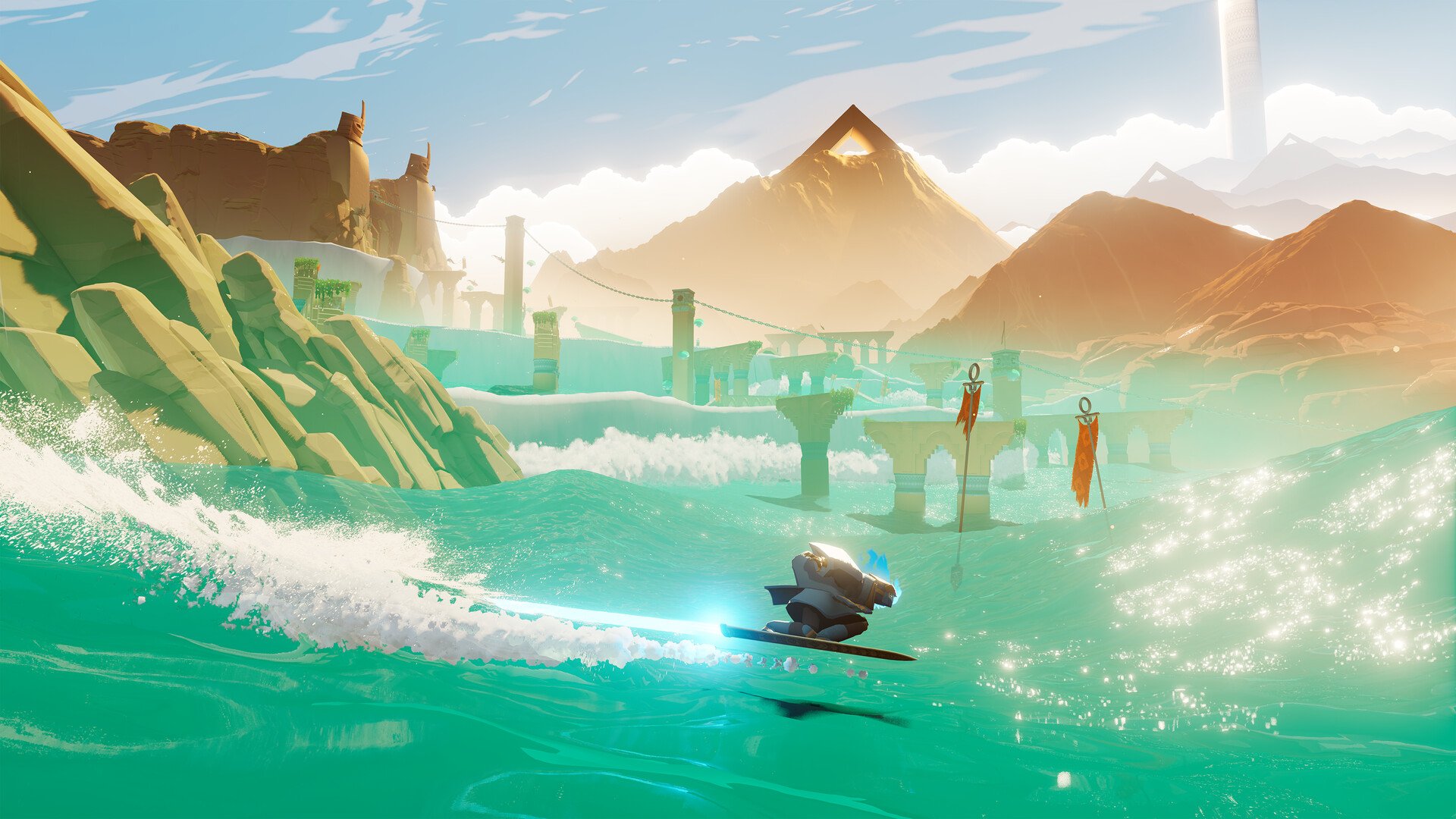Sword of the Sea has arrived, promising a unique surfing adventure from the creators of ABZÛ and Journey. But does it live up to the hype? In this review, we'll explore the gameplay, analyze the price, and assess its availability across different platforms. Is Sword of the Sea a must-have title, or should you wait for a sale? We'll help you decide!

A Unique Surfing Adventure
Sword of the Sea is an atmospheric surfing adventure developed by Giant Squid, the team behind critically acclaimed titles like ABZÛ, The Pathless, and Journey. This pedigree alone sets high expectations, and the game aims to deliver a unique experience centered around high-speed traversal and exploration. Players take on the role of the Wraith, resurrected in a desolate Necropolis with the quest to unveil an ancient sea buried beneath the land. The primary mode of transportation is the Hoversword, an ancient and powerful artifact that combines elements of a snowboard, skateboard, and surfboard. This allows for carving through sand dunes, pulling off tricks, and exploring a visually stunning world. The gameplay loop involves mastering the Hoversword's mechanics to navigate the environment, uncover secrets, and restore life to the barren landscapes. Sword of the Sea sets itself apart with its focus on fluid movement and meditative exploration, rather than combat or traditional platforming challenges. The emphasis is on creating a seamless connection between the player and the environment, fostering a sense of wonder and discovery as you glide across the undulating terrain. The game's world is filled with skatepark-like ruins and sinking tombs that hint at a lost civilization, providing visual variety and opportunities for creative expression. The environments range from sandy deserts to glacial mountains, each offering unique challenges and secrets to uncover. Sword of the Sea is designed for players who appreciate atmospheric exploration, fluid movement mechanics, and visually stunning environments. It’s geared towards gamers who enjoy titles like Journey, ABZÛ, and The Pathless, which prioritize emotional impact and immersive world-building over complex gameplay systems.
Performance, Value, and Platform Analysis
When considering whether to invest in Sword of the Sea, performance and value are critical factors. Let's break down the key aspects:
System Requirements
Here are the minimum and recommended PC specifications:
Minimum:
- OS: Windows 10
- Processor: Intel Core i5-9400 or AMD Ryzen 5 2600
- Memory: 12 GB RAM
- Graphics: NVIDIA GeForce GTX 1070, 8GB or AMD Radeon RX 5600, 6GB
- Storage: 15 GB available space
Recommended:
- OS: Windows 11
- Processor: Intel Core i5-12600K or AMD Ryzen 7 5700X
- Memory: 16 GB RAM
- Graphics: NVIDIA GeForce RTX 2080 Ti, 11GB or AMD Radeon VII, 16GB
- Storage: 15 GB available space
Based on these specifications, Sword of the Sea seems relatively demanding, especially on the GPU. Players with older systems might need to lower settings to achieve stable frame rates. Make sure to check your specs before purchase!
Pricing and Value
The game is priced at 28,99€. Considering the length of gameplay and depth of the experience, this price point positions it competitively among indie titles. However, potential buyers need to weigh the cost against the actual content and replayability. Is Sword of the Sea worth the price? It depends on your preferences. If you value atmospheric exploration, unique movement mechanics, and artistic visuals, then the price is reasonable. If you're looking for a combat-heavy or story-driven game, you might find the experience lacking in depth.
Platform Availability
Currently, the game is confirmed for PC (via Steam). While the developers have emphasized controller support, including DualSense features, the lack of console versions might disappoint some players. Whether Sword of the Sea will arrive on other platforms like the Switch, Xbox, or PlayStation remains to be seen. Check back for updates!
Performance Analysis
While a detailed performance analysis requires thorough testing, early reports suggest that the game runs smoothly on systems meeting the recommended specifications. However, some users have reported minor stutters and frame drops on less powerful hardware. Overall, the performance seems optimized for mid-to-high-end PCs. More comprehensive tests will offer a clearer picture of how the game performs across a range of hardware configurations.

Contextual Analysis and Community Reception
Sword of the Sea arrives with a significant amount of hype, largely fueled by the reputation of Giant Squid and the artistic vision of Matt Nava, known for his work on ABZÛ, The Pathless, and Journey. The game distinguishes itself through its unique surfing mechanic on sand and water, combined with a visually stunning world design reminiscent of skateparks and ancient ruins. Community reception has been largely positive, with many praising the game's atmosphere, fluid movement, and artistic direction. Comparisons to Journey are frequent, highlighting the shared emphasis on exploration and emotional impact. The lack of combat and traditional gameplay challenges, however, may deter some players seeking more action-oriented experiences.
Longevity and Replayability
While Sword of the Sea offers a unique and memorable experience, its long-term appeal remains to be seen. The absence of multiplayer or extensive post-launch content may limit its replayability for some players. However, the game's emphasis on exploration and discovery encourages multiple playthroughs to uncover all of its secrets. Additionally, the visually stunning world and meditative gameplay loop can provide a relaxing and rewarding experience for those who enjoy atmospheric exploration games.
Addressing the Content Gap
Existing coverage of Sword of the Sea primarily focuses on its artistic direction and unique gameplay mechanics. This review aims to address the content gap by providing a more comprehensive analysis of its performance, value, and platform availability. By examining the system requirements, pricing, and potential for future updates, we hope to offer a more informed perspective on whether the game is worth buying.
Potential Future Updates
As a relatively new release, Sword of the Sea has the potential to evolve through future updates and content additions. The developers could introduce new areas to explore, gameplay mechanics, or even multiplayer features to extend the game's longevity. Keep an eye on future announcements from Giant Squid for potential updates!
Final Verdict: Should You Ride the Wave?
Sword of the Sea offers a unique and visually stunning surfing adventure that sets itself apart from other games in the genre. Its fluid movement mechanics, atmospheric world design, and meditative gameplay loop create a relaxing and immersive experience. However, its relatively high system requirements, limited platform availability, and lack of traditional gameplay challenges may deter some players. If you appreciate atmospheric exploration games and are drawn to the artistic vision of Giant Squid, then Sword of the Sea is worth the investment. If you're seeking a combat-heavy or story-driven game, you might want to wait for a sale or consider alternative options. Overall, Sword of the Sea delivers a memorable and visually impressive experience that stands out for its artistic flair and unique gameplay mechanics. Whether it's worth buying depends on your personal preferences and expectations.
Pros & Cons
✅ Pros
- Unique and fluid surfing mechanics
- Visually stunning world design
- Meditative and relaxing gameplay loop
- Strong artistic direction from Giant Squid
- Immersive atmospheric exploration
❌ Cons
- Relatively high system requirements
- Limited platform availability (PC only)
- Lack of traditional gameplay challenges (e.g., combat)
- May lack long-term replayability for some players
- Price point might be too high for the content offered